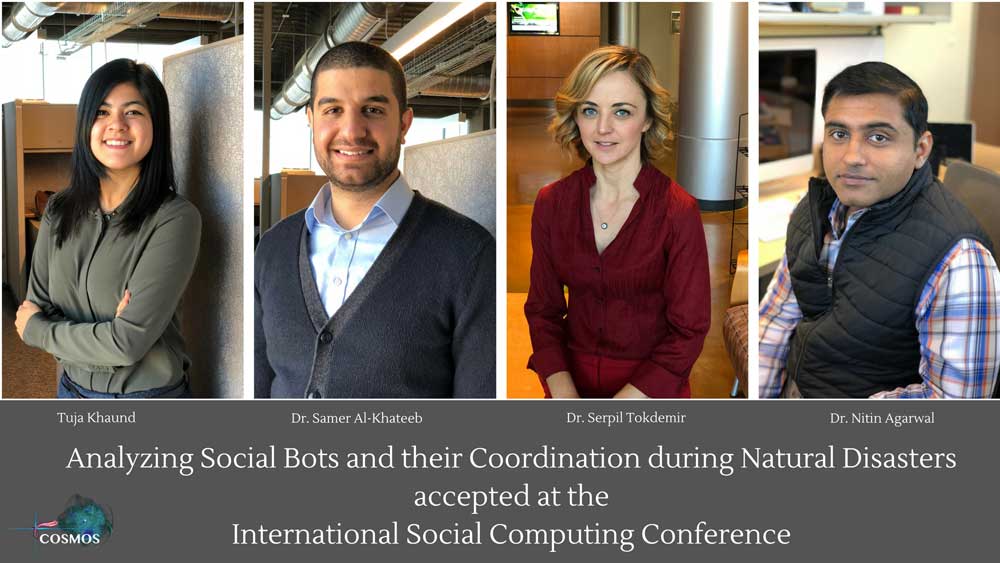Social bots disrupt online communication about natural disasters
Researchers at the University of Arkansas at Little Rock are studying how social bots influence the delivery of news via social media during major disasters.
The study examines the role of social bots – automated Twitter accounts that attempt to affect or influence the behaviors of others – and their coordination and communication patterns with complex organizational structures to disseminate information during four natural disasters that occurred in 2017.
The paper, “Analyzing Social Bots and their Coordination during Natural Disasters,” will be discussed at the SBP BRiMS 2018 International Conference on Social Computing, Behavioral-Cultural Modeling, & Prediction and Behavior Representation in Modeling and Simulation to be held July 10-13 in Washington D.C.
Tuja Khaund, a Ph.D. student in computer and information science at UA Little Rock, is the lead author who will present the paper. She is also a researcher at COSMOS (Collaboratorium for Social Media and Behavioral Studies) – a research group led by Dr. Nitin Agarwal, Jerry L. Maulden-Entergy Endowed Chair and Distinguished Professor of Information Science. Khaund also presented this work at the UA Little Rock Student Research and Creative Works Showcase and was awarded first place in the graduate student technology division.
The paper’s co-authors include Dr. Samer Al-Khateeb, a postdoctoral research fellow at COSMOS, Dr. Serpil Tokdemir, a research project analyst at the office of Medicaid Inspector General and a postdoctoral research fellow at COSMOS, and Agarwal.
Researchers collected data from Twitter during Hurricanes Harvey, Irma, and Maria as well as the 7.1-magnitude Central Mexico earthquake that killed 370 people on Sept. 19, 2017. The study resulted in the collection of more than 1.2 million tweets generated by more than 800,000 Twitter accounts.
The researchers detected the presence of social bots in the collected dataset and studied the social networks of the top ranked bot accounts as well as the top ranked non-bot accounts (humans) and then compared both networks.
They discovered that social bots, which evolve constantly and become more sophisticated as time progresses, can disrupt discourse in online spaces. While humans have more tightly knit online communities, social bots tend to make rather weaker connections that result in a lack of a sense of belonging in the online community.
Analysis of their content revealed that the discourse was not just limited to the disaster events. Non-relevant hashtags including hoaxes and alternate narratives were latched on to the event-specific hashtags and were disseminated in Spanish, Arabic, French, and Japanese, among other languages.
In future research, COSMOS investigators hope to understand the different strategies that social bots use to coordinate disinformation campaigns in which online discourse is successfully manipulated.
The research is supported in part by grants from the U.S. Office of Naval Research (ONR), U.S. Defense Advanced Research Projects Agency (DARPA), and the Maulden-Entergy endowment at UA Little Rock. Any opinions, findings, and conclusions or recommendations expressed in this material are those of the authors and do not necessarily reflect the views of the funding organizations. Researchers gratefully acknowledge the support.
